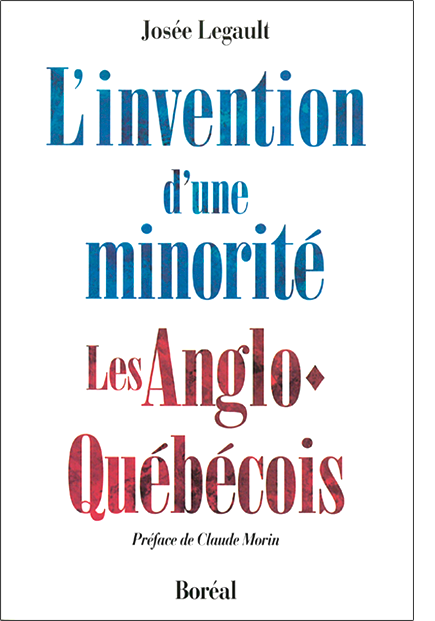May 31, 2015
 L’invention d’une minorité
L’invention d’une minorité
les Anglo-Québécois
Josée Legault
1992
J’ai pris la peine de retranscrire la couverture arrière à la main :
Depuis les années 60, plus particulièrement depuis l’adoption des premières législations linguistiques, une nouvelle voix s’est élevée au Québec, celle des anglophones.
Ses principaux ténors se nomment JULIUS GREY, REED SCOWEN, WILLIAM JOHNSON, The Gazette, Alliance Québec, le Parti Égalité, MORDECAI RICHLER… Ils sont unanimes à dénoncer une majorité francophone intolérante qui opprimerait la minorité anglophone. Ce discours, qui jouit d’une vaste audience chez les autres anglophones de l’Amérique du Nord et donne un portrait mensonger des francophones, propage une désinformation coûteuse pour tous les Québécois.
Il est certain qu’un tel discours trahit la compréhensible frustration d’une ancienne minorité dominante qui voit sa suprématie remise en question. Mais il s’agit d’abord et avant tout – et cet essai le fait sortir de brillante façon – d’une arme politique.
JOSÉE LEGAULT se livre à une analyse minutieuse du discours anglo-québécois et montre comment celui-ci, sous le couvert de la défense des droits individuels, cherche au contraire à promouvoir les droits et intérêts collectifs de la communauté dont il émane. Elle montre ensuite comment les Anglo-Québécois se servent de cette arme dans leur quête de l’égalité linguistique et dans leur refus du statut de minorité.
Un livre démystificateur qui bousculera nombre d’idées reçues.
***
J’ai ensuite eu envie de le mettre en relation avec ça :
Q and A: Jay Baruchel talks about why he’s high on Hogtown
Brendan Kelly, Montreal Gazette, May 29, 2015
(…) The longtime Montrealer now admits that part of the reason behind his move to Toronto is that “Quebec’s politics did my head in.“
‘Here he talks about what prompted him to do what so many anglo Montrealers have done in the past four decades and make the move down the 401.’
(…)
‘JB: (… ) It’s just a bit of an easier place to live than back home. The last election was very traumatic in a way.
MG: Why?
JB: I was faced with a truth: I either will just swallow it and make peace with it, like I always have, that this is part and parcel of what it is to live in Montreal, the political climate as it is. It was either shut up or move. It was untenable. It was my fault if I keep living someplace that keeps giving me a headache.
MG: Well, obviously the Liberals won that provincial election. So what I take from that is that separation, the referendum, was one of the big issues in that election, and it’ll be a big issue in the next provincial campaign, and you can’t deal with that anymore.
JB: And it always will be. Aside from that silly stuff, which I wish would just go away but it won’t, it was less that than the kind of poisonous ethnic dialogue, which really, really left a sour taste in my mouth. It didn’t feel like the place that Mom wanted me to live in. She wanted me to grow up in someplace multicultural and to see every complexion of the world on the street, and to hear all the languages, and for that not to be a defeat or a sacrifice, but a good thing and a strength. You come here and it really is a pretty diverse place. Just some of the issues, some of the editorial subject matter in Quebec — it’s from 100 years in the past, man. I wake up here and I’m just a dude in a city. And when I go outside and speak English, it’s not a loaded or political deed of any kind. I’m just living. There’s just way less headaches here. Everything is a bit easier here.
(…)
JB: (…) That’s the other thing I realized: I don’t have a particular (passion) for the province of Quebec. I have a great deal of love for Montreal, but really, more than anything, it’s just my neighbourhood — it’s just N.D.G. So I miss that, but it happens to be located in a pretty difficult part of the world.’ (ouin?) …
***
Identité culturelle, sept septembre MMXII, St-Henri, Montréal p.Q. (September 7, 2012)
***
Les relations ANGLO-FRANCO dans
le cinéma québécois :
Reaction: A Portrait of a Society in Crisis (1973) by ROBIN SPRY (May 1, 2015)
Le journal de madame Wollock (1979) de GILLES BLAIS (January 15, 2015)
Le sort de l’Amérique (1996) de JACQUES GODBOUT (January 16, 2015)
Speak White (1980) & Le temps des bouffons (1985) de PIERRE FALARDEAU et JULIEN POULIN (January 20, 2015)
Le mouton noir (1992) & Les héritiers du mouton noir (2003) de JACQUES GODBOUT (January 22, 2015)
Le confort et l’indifférence (1981) de DENYS ARCAND (January 26, 2015)
Le chat dans le sac (1964) de GILLES GROULX (April 7, 2014, à la toute fin de l’entrevue)
Québec Soft (1985) de JACQUES GODBOUT (June 24, 2011)
Mon oncle Antoine (1971) de CLAUDE JUTRA (December 24, 2010)
Les événements d’octobre 1970 (1974) de ROBIN SPRY (October 6, 2010)
***
Entrevue avec JEAN-FRANÇOIS AUBÉ, auteur des ‘yeux de la Nation’ (2014) (April 7, 2014)
De quoi le québec a-t-il besoin? (2011) de JEAN BARBE et MARIE-FRANCE BAZZO
(November 29, 2011)

